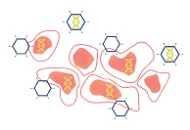 |
| A depiction of the viral vectors (blue) infecting the tumor cells and delivering the gene therapy (yellow) into their cell nuclei.--Courtesy of MultiVir |
Houston's MultiVir, a developer of viral vectors to deliver anticancer gene therapy, just filed for a $70 million IPO with the Securities and Exchange Commission as it seeks funding for clinical trials of its Phase I/II lead candidates for colorectal cancer and head and neck cancer, and to take the first FDA-approved gene therapy to the market.
Both candidates utilize adenovirus as their specific vector. It does not typically integrate into the host cell's DNA, reducing the risk of side effects and disruptions to normal gene function. Other MultiVir candidates use a herpes simplex and vaccinia virus platform.
The two lead candidates have completed Phase I. The company plans to advance them into Phase I/II trials, where they will be tested as combination therapies. "The side effects of viral gene therapies do not typically overlap with those of commonly used cancer treatments such as chemotherapy, radiation and monoclonal-antibody immunotherapy, which we believe will permit combination treatments with existing therapies," the filing says. The side effects of viral vectors can include allergic reactions, fever, fatigue, nausea and low blood pressure, according to the filing.
The products will be developed in combination with drug delivery devices, like a pump or injection system, MultiVir says. For optimal bioavailability, the colorectal cancer candidate (Ad-p53) will use intra-arterial delivery, while the head and neck cancer candidate (Ad-IL-24) will utilize intratumoral administration because the gene therapy being employed secretes a protein, according to the filing. Both techniques require a high level of surgical technique and precision.
China's SiBiono GeneTech is selling an adenovirus drug similar to p53 in that country. MultiVir says SiBiono is violating some of its patents, but says the drug is not available in the U.S. or Europe, where the Chinese company has yet to file for approval.
MultiVir reported a loss of $2.9 million in 2014, up from $1 million in 2013. R&D expenditure more than doubled during that time period to $1.67 million in 2014. A $70 million IPO would allow it to keep investing in drug delivery and biological research at a significantly high rate, in the hopes of a payoff down the road for patients and Wall Street investors.
- here's the S-1 filing with the SEC